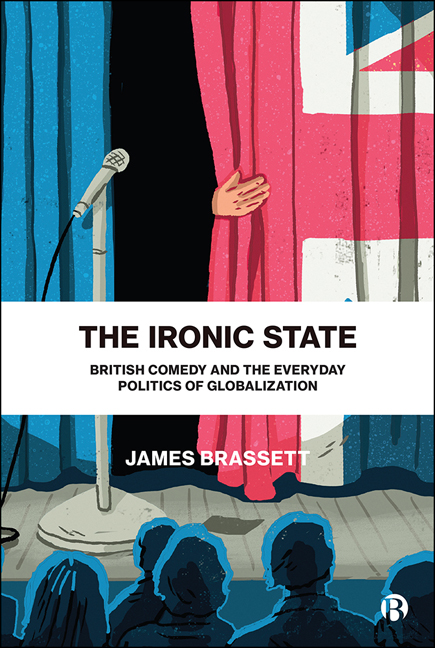Book contents
- Frontmatter
- Contents
- Acknowledgements
- Introduction: Comedy and the Politics of (Global) Resistance
- 1 Everyday Comic Resistance in Global Context
- 2 The Satire Boom: Imperial Decline and the Rise of the Everyday Elite
- 3 Alternative Comedy and Resistance to ‘Thatcher’s Britain’
- 4 Irony and the Liminality of Resistance
- 5 Austerity and the Rise of Radical Comedy
- 6 Brexit, or How I Learned to Stop Worrying and Love the Single Market
- 7 The Globalization of Comic Resistance?
- Bibliography
- Index
1 - Everyday Comic Resistance in Global Context
Published online by Cambridge University Press: 04 January 2022
- Frontmatter
- Contents
- Acknowledgements
- Introduction: Comedy and the Politics of (Global) Resistance
- 1 Everyday Comic Resistance in Global Context
- 2 The Satire Boom: Imperial Decline and the Rise of the Everyday Elite
- 3 Alternative Comedy and Resistance to ‘Thatcher’s Britain’
- 4 Irony and the Liminality of Resistance
- 5 Austerity and the Rise of Radical Comedy
- 6 Brexit, or How I Learned to Stop Worrying and Love the Single Market
- 7 The Globalization of Comic Resistance?
- Bibliography
- Index
Summary
Introduction
While the study of comedy and politics can boast a venerable lineage that spans several disciplines and theoretical approaches, the practice of comic resistance is not normally considered an important subject of global politics. Indeed, as the Introduction argued, at least one of the key approaches – the instrumental approach – has understood the political significance of comedy in fundamentally state-centric terms. Although the critical approach raised wider, utopian concerns with truth, emancipation, and ‘the people’, it had a tendency to read modern manifestations of comedy as either a legitimating or a disciplinary element in modernity and global capitalism. On this view, the resistant potential of comedy was deeply qualified, as likely an ideological smokescreen, or a ‘medicinal bath’ for docile market subjects. Instead, this book will read comedy as an everyday practice of resistance in global context, where the very idea of resistance is politically productive: part of the generative grammar of global market life.
This chapter will situate comic resistance in global context by engaging the everyday turn in IR and IPE. This literature foregrounds the importance of (apparently) small, mundane, or otherwise marginal actors and practices in global politics (Best and Paterson, 2010; Solomon and Steele, 2017; Elias and Roberts, 2018). Crucial to the everyday turn is the idea that the agency of non-elite subjects is far greater than is normally assumed by mainstream approaches to the ‘big issues and actors’ of the ‘international system’ (Hobson and Seabrooke, 2007). This can yield a critical position on the politics of globalization whereby a prevailing focus on large states (and their elites), or the structural power of global capitalism, is supplanted by the constitutive agency of everyday market subjects and rationalities (Langley, 2007). On this view, it is not simply that everyday actors and practices are ‘added onto’ the study of global politics, but that their self-understandings and habits can tell us much about how global politics is ‘known’, shaped and constructed (Brassett, 2018). In turn, I will argue, the circulation of – and resistance to – specific rationalities and discourses of globalization can be refigured as a contingent process located in everyday practices of global politics like comedy.
- Type
- Chapter
- Information
- The Ironic StateBritish Comedy and the Everyday Politics of Globalization, pp. 17 - 36Publisher: Bristol University PressPrint publication year: 2021



